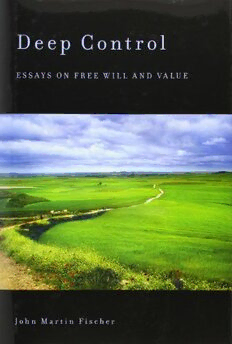Table Of ContentDeep Control
This page intentionally left blank
Deep Control
ESSAYS ON FREE WILL AND VALUE
John Martin Fischer
3
1
O xford University Press, Inc., publishes works that further
Oxford University’s objective of excellence
in research, scholarship, and education.
Oxford New York
Auckland Cape Town Dar es Salaam Hong Kong Karachi
Kuala Lumpur Madrid Melbourne Mexico City Nairobi
New Delhi Shanghai Taipei Toronto
With offi ces in
Argentina Austria Brazil Chile Czech Republic France Greece
Guatemala Hungary Italy Japan Poland Portugal Singapore
South Korea Switzerland Th ailand Turkey Ukraine Vietnam
Copyright © 2012 Oxford University Press
Published by Oxford University Press, Inc.
198 Madison Avenue, New York, New York 10016
www.oup.com
Oxford is a registered trademark of Oxford University Press
All rights reserved. No part of this publication may be reproduced,
stored in a retrieval system, or transmitted, in any form or by any means, electronic,
mechanical, photocopying, recording, or otherwise,
without the prior permission of Oxford University Press.
Library of Congress Cataloging-in-Publication Data
Fischer, John Martin, 1952-
Deep control : essays on free will and value / John Martin Fischer.
p. cm.
ISBN 978-0-19-974298-1 (alk. paper)
1. Free will and determinism. 2. Values. 3. Fortune. I. Title.
BJ1461F485 2011
123’.5—dc22 2010053173
1 3 5 7 9 8 6 4 2
Printed in the United States of America
on acid-free paper
CONTENTS
Acknowledgments vii
1. Deep Control: The Middle Way 3
PART ONE An Actual-Sequence Approach to Moral Responsibility
2. The Frankfurt Cases: The Moral of the Stories 33
3. Freedom, Foreknowledge, and Frankfurt: A Reply to Vihvelin 5 3
4. The Importance of Frankfurt-Style Argument 67
5. Blame and Avoidability: A Reply to Otsuka 76
6. Indeterminism and Control: An Approach to the Problem of Luck 85
PART TWO The Middle Path: Guidance Control
7. The Direct Argument: You Say Goodbye, I Say Hello 109
8. Conditional Freedom and the Normative Approach to Moral
Responsibility 122
9. Judgment-Sensitivity and the Value of Freedom 144
10. Sourcehood: Playing the Cards That Are Dealt You 163
11. Guidance Control 186
12. The Triumph of Tracing 206
Index 235
This page intentionally left blank
ACKNOWLEDGMENTS
I gave previous versions of chapters 2 (“Th e Frankfurt Cases: Th e Moral of the
Stories”), 8 (“Conditional Freedom and the Normative Approach to Moral Responsi-
bility”), 9 (“Judgment-Sensitivity and the Value of Freedom”), 10 (“Sourcehood:
Playing the Cards Th at Are Dealt You”), 11 (“Guidance Control”), and 12 (“Th e
Triumph of Tracing”) as the Hourani Lectures on Human Values at the State
University of New York at Buff alo in the fall of 2008. I thank the people at the
Department of Philosophy, SUNY at Buff alo, for the opportunity to give the lectures
and for their many generous and helpful comments, as well as for their warm
hospitality. I am also very grateful to Patrick Todd and Garrett Pendergraft for their
assistance in preparing this book for publication, and to Patrick Todd, Justin Coates,
and Neal Tognazzini for insightful comments on the introductory essay.
Permission to reprint the following articles is hereby acknowledged:
“Introduction: Deep Control: Th e Middle Way”; the fi rst two sections contain
material that is a lightly revised version of John Martin Fischer, “Precis of My Way:
Essays on Moral Responsibility ” (Part of a book symposium on M y Way ), Philosophy
and Phenomenological Research 80 (2010): 229–41.
“Th e Frankfurt Cases: Th e Moral of the Stories,” Th e Philosophical Review 119
(2010): 315–36.
“Freedom, Foreknowledge, and Frankfurt: A Reply to Vihvelin,” Canadian
Journal of Philosophy 38 (2008): 327–42.
“Th e Importance of Frankfurt-Style Argument,” P hilosophical Quarterly 37
(2007): 464–71.
“Blame and Avoidability: A Reply to Otsuka” (with Neal A. Tognazzini),
Journal of Ethics 14 (2009): 43–51.
“Indeterminism and Control: An Approach to the Problem of Luck,” in
Michael Freeman, ed., C urrent Legal Issues: Law and Neuroscience (Oxford: Oxford
University Press, 2010), 41–59.
“Th e Direct Argument: You Say Goodbye, I Say Hello.” in D. Cohen and N.
Trakakis, eds., Essays on Free Will and Moral Responsibility (Newcastle upon Tyne:
Cambridge Scholars Publishing, 2009): 31–44.
“Conditional Freedom and the Normative Approach to Moral Responsibility,”
revised and expanded version of part of “Responsibility and the Kinds of Freedom,”
Journal of Ethics 12 (2008): 203–28.
“Judgment-Sensitivity and the Value of Freedom,” revised and expanded ver-
sion of part of “Responsibility and the Kinds of Freedom,” J ournal of Ethics 12
(2008): 203–28. vii
viii Acknowledgments
“Sourcehood: Playing the Cards Th at Are Dealt You,” revised version of
“Playing the Cards Th at Are Dealt You,” Journal of Ethics 10 (2006): 235–44; also,
additional material from “My Way and Life’s Highway: Replies to Steward,
Smilansky, and Perry,” J ournal of Ethics 12 (2008): 167–89.
“Guidance Control,” revised versions of material from “Manipulation and
Guidance Control: A Reply to Long,” in Joseph Keim Campbell, Michael O’Rourke,
and Harry S. Sliverstein, eds., Action, Ethics, and Responsibility (Cambridge, MA:
MIT Press, 2010): 175–86; “Reply: Th e Free Will Revolution,” part of a book sympo-
sium on John Martin Fischer and Mark Ravizza, R esponsibility and Control: A
Th eory of Moral Responsibility, Philosophical Explorations 8 (2005): 145–56; and
“Th e Free Will Revolution (Continued),” Journal of Ethics 10 (2006): 315–46.
“Th e Triumph of Tracing” (with Neal A. Tognazzini), revised version of “Th e
Truth About Tracing,” N ous 43 (2009): 531–56.
Deep Control

